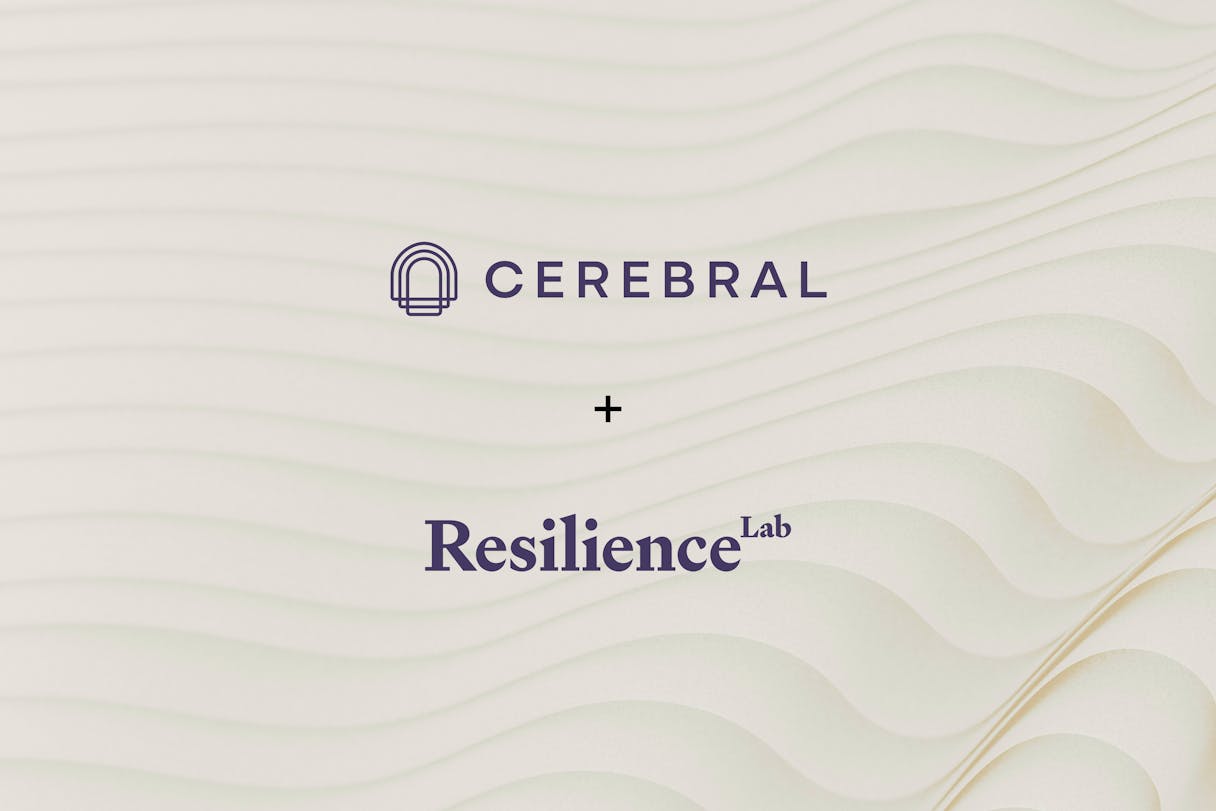What Are The Different Types of Therapy?

Has this ever happened to you? You search and search for an affordable, available, and high-quality mental health therapist near you. (Thankfully, Cerebral makes finding great therapists easy.)
Then, after your in-depth searching, you find someone who looks like a good fit. They have an advanced degree. They’re licensed in your state. They know how to treat people just like you. They seem perfect.
But then, you notice they deliver specific types of therapy that you’ve never heard of. They mention things like CBT, DBT, Motivational Interviewing, or Gestalt therapy. Suddenly, you’re not so sure what to expect. Are they actually a fit for you?
There are a lot of questions about what psychotherapy involves and the different types of therapy that practitioners provide.
Don't be discouraged by these questions; they shouldn't hinder you from receiving the care you deserve. Continue reading to learn about the most common types of therapy that online therapists offer. Understanding their meanings and what to expect will help you determine which therapists are the best fit for you.
A note on Cerebral therapists
Before we dive into the therapy types, though, here’s an important note on Cerebral therapists.
All Cerebral therapists are either fully licensed or working toward full licensure under the direct supervision of a licensed clinical supervisor. They have graduate degrees from accredited institutions and are well-versed in the most common types of therapy.
Even more, Cerebral therapists focus on evidenced-based therapeutic techniques. These approaches are grounded in solid scientific evidence found in rigorous clinical trials.
Now, onto the most-common therapy types.
Common types of mental health therapy
These therapy types are listed in alphabetical order, not in order of importance or popularity. Your therapist will decide if one of the below therapy types will work well for you. You can also read your therapist’s bio to see if they mention any of the below.
Acceptance and commitment therapy (ACT)
As its abbreviation suggests, acceptance and commitment therapy is all about ACTing with understanding. Another way to look at the abbreviation ACT is:
A: Accept the reality of your situation, your thoughts, and your feelings.
C: Choose a direction that aligns with your values
T: Take action to put your values into practice
ACT therapy may be a good way for you to learn how to understand and accept yourself and others. From there, you can identify what really matters to you and act accordingly, which may help you feel better about your life.
Attachment-based therapy
This type of therapy is built on attachment theory, which is about the types of relationship bonds you form when growing up. Learn about attachment theory and attachment styles in our blog post: What is my attachment style?
The bonds you form with your caregivers as an infant can deeply affect your relationships as an adult. This type of therapy is all about relationships. Your therapist will discuss your upbringing and current relationships so you can understand how old patterns might be affecting you today.
Cognitive behavioral therapy (CBT)
CBT is a common type of therapy that can be used to treat anxiety, depression, and phobias. It emphasizes the connection between your thoughts and memories (cognition) and your emotions and feelings (behavior).
With CBT, you learn how to change negative, automatic thought patterns or beliefs that impact your behavior and emotions.
Cerebral offers CBT exercises with all of our plans. Learn more about our CBT exercises here.
Cognitive processing therapy (CPT)
Similar to TF-CBT (trauma-focused cognitive behavioral therapy), cognitive processing therapy is a type of CBT that specifically treats trauma. What makes CPT unique is that clients often write out a statement about the trauma. From there, the client learns to ask useful questions for understanding unhelpful thoughts about the trauma.
This type of therapy is mostly found with treating combat veterans and survivors of natural disasters, assault, or child abuse.
Dialectical behavioral therapy (DBT)
The word “dialectical” means the ability to view issues from multiple, sometimes opposite perspectives and arrive at a reasonable conclusion. With DBT, clients are guided in accepting the reality of their life and behavior as they are—while also learning how to change them.
Because it is designed to treat high-risk behaviors and conditions like self injury and borderline personality disorder, Cerebral therapists may only use elements of DBT in online practice.
Eye movement desensitization and reprocessing (EMDR)
EMDR is another type of therapy that focuses on treating trauma and distressing past experiences. In EMDR, clients focus on traumatizing memories while also experiencing bilateral (side-to-side) stimulation, or BLS. BLS can consist of bilateral eye movements, physical tapping, or other sensations. Doing this can actually change the way a painful memory is stored in the brain, and the negative power of the memory can be reduced.
Exposure therapy
In this type of therapy, therapists create a safe space for clients to confront their fears. Being exposed to these objects, activities, or situations of fear can reduce the patient’s fear. There are many types of exposure therapy; for example: virtual reality exposure, direct exposure, or imagining the object of fear.
Exposure therapy can treat a range of conditions, including phobias, anxieties, PTSD, and more.
Expressive therapies
Expressive therapies include any therapy that focuses on expression as a main focus of treatment. These include art therapy, dance movement therapy, and drama therapy, among many others.
With these therapies, clients can act out, perform, or otherwise express their internal experiences. The physical element of expressive therapies has also been shown to foster healing.
Expressive therapy may not only help the clients express themselves in ways they can’t verbally, the very act of expression may itself create the right conditions for healing.
Gestalt therapy
One unique aspect of Gestalt therapy is that it focuses on the client's life as it is today, rather than diving deeply into the patient’s past or development. By bringing the patient face-to-face with life as it is, Gestalt therapy helps people address the issues within their current environment that may trigger a negative reaction.
Common techniques in Gestalt therapy are role playing and fast-answer, or “hot seat”, questioning.
Internal family systems (IFS)
Does it sometimes feel like there’s more than one version of “you” inside of you? The idea behind IFS is that there is. Not to be confused with dissociative identity disorder, IFS suggests that different “parts” of you, like an inner critic, often take charge of your thinking. Problems arise when you aren’t aware of these takeovers and lose your “core” self to them.
So, in IFS, clients learn to connect with their sometimes hidden parts and integrate them in a healthy way into the constellation that revolves around the “core personality.”
Motivational interviewing
Quite often there’s a big difference between the ways you act and what you want or how you want to be. The goal of motivational interviewing is to recognize when those differences occur and make decisions about how best to act.
In this type of therapy, the therapist may ask many questions and offer support for your process of understanding. When the time is right to take action, they’ll help you along the way.
Motivational interviewing has been shown to be especially effective for substance use disorders.
Narrative therapy
Narrative therapy makes you the author of your own life story. How we tell our own life story to ourselves and others is extremely important for how we view ourselves. Narrative therapy helps clients peer deeply into their own lives, see the patterns that we experience, and restructure our own stories to be more positive and life affirming.
Polyvagal theory
The vagus nerve is a major nerve that runs from your brain to many parts of your body. Researchers have found that the vagus is extremely important to the mind-body connection. If mind is body and body is mind, it is this nerve that significantly makes it so.
Polyvagal theory focuses on how this nerve works for your nervous system. By practicing certain techniques, like certain breathing exercises, clients can effectively re-pattern their nervous system. This type of therapy is particularly helpful for reducing trauma and stress responses.
Rational emotive behavior therapy (REBT)
REBT is another form of CBT. The aim of REBT is to interrupt self-defeating beliefs that cause people to act negatively. This form of therapy helps people reframe their desires as things to work toward, rather than expect or demand. REBT works to help clients form more effective beliefs and take more positive actions.
Reality therapy
Reality therapy is all about taking responsibility for your actions and the way you see the world. What are your beliefs that don’t correspond to reality? What are the habits that don’t truly serve your wellbeing? Reality therapy seeks to help clients understand the reality of their lives and respond to it in healthy ways.
Solution-focused therapy
The definition of solution-focused therapy is in its name. This form of therapy takes a hard look at what you’re experiencing in the here and now and helps you develop goals to solve those problems.
Cerebral can help
Finding the right kind of therapy that resonates with your individual needs can be a daunting task, but Cerebral is here to simplify that process for you. Our team of highly experienced therapists are skilled in a wide array of therapeutic techniques and are committed to understanding your specific needs to help find the best therapy match for you. We believe that your journey towards a healthier mind should be personalized, straightforward, and reassuring, which is why we’re dedicated to supporting you every step along the way. Sign up to get started!

Our Care: The Resilience Methodology

A New Era of Mental Healthcare: How Cerebral Is Expanding High-Quality, Personalized Care

5 Things to Look for in a Therapist

Call 911 if you’re having a
mental health emergency
Text Home to 741-741 if you're in emotional
distress and need immediate support
Call or text 988 Suicide &
Crisis Lifeline. Chat service
is available at 988lifeline.org.